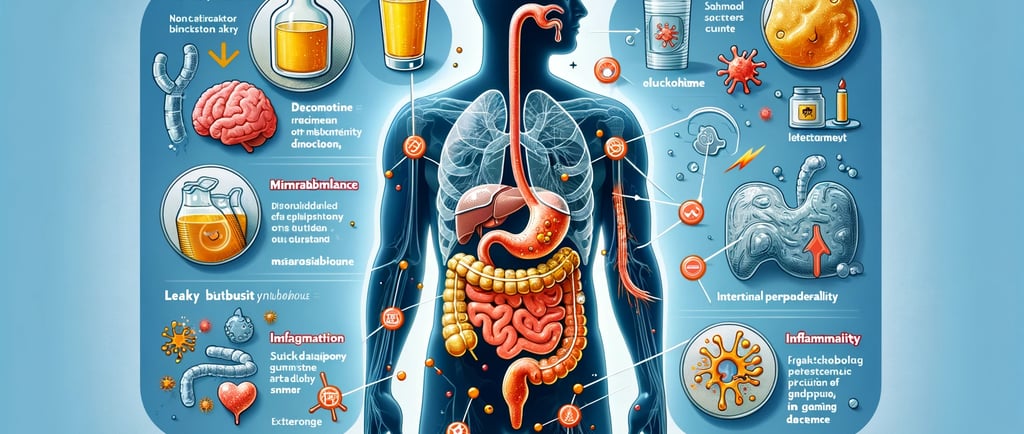How Does Alcohol Impact Your Gut Microbiome & Leaky Gut?
Understanding the Gut Microbiome
HEALTH
5/29/20243 min read


How Does Alcohol Impact Your Gut Microbiome & Leaky Gut?
The gut microbiome, a complex ecosystem of trillions of microorganisms residing in the digestive tract, plays a crucial role in maintaining overall health. These microorganisms are involved in various essential functions, including digestion, immune response, and even mental health. However, lifestyle factors such as diet and alcohol consumption can significantly impact the balance of the gut microbiome, leading to potential health issues. One such concern is the development of a leaky gut. This article explores how alcohol affects the gut microbiome and contributes to leaky gut syndrome.
Understanding the Gut Microbiome
The gut microbiome consists of bacteria, viruses, fungi, and other microorganisms that live in the intestines. A healthy gut microbiome is characterized by a diverse range of beneficial microbes that support digestion, produce vitamins, and protect against harmful pathogens. An imbalance in this ecosystem, known as dysbiosis, can lead to various health problems, including digestive disorders, immune dysfunction, and mental health issues.
What is Leaky Gut Syndrome?
Leaky gut syndrome, or increased intestinal permeability, occurs when the lining of the small intestine becomes damaged, allowing undigested food particles, toxins, and microbes to pass through the intestinal wall and enter the bloodstream. This can trigger an immune response, leading to inflammation and a range of health issues, such as food sensitivities, autoimmune diseases, and gastrointestinal disorders.
The Impact of Alcohol on the Gut Microbiome
Alcohol can profoundly affect the gut microbiome, leading to dysbiosis and contributing to the development of leaky gut syndrome. Here’s how:
Disruption of Microbial Balance: Alcohol consumption can alter the composition of the gut microbiome by reducing the number of beneficial bacteria and promoting the growth of harmful bacteria. This imbalance can compromise the gut's ability to function correctly.
Inflammation: Alcohol induces inflammation in the gut lining, which can damage the intestinal barrier and contribute to leaky gut syndrome. Chronic inflammation can further exacerbate gut permeability and microbial imbalance.
Reduced Microbial Diversity: A healthy gut microbiome is diverse, with a wide variety of microbial species. Alcohol consumption can reduce this diversity, weakening the gut’s resilience and ability to recover from disturbances.
Impaired Gut Motility: Alcohol can affect the movement of the intestines, leading to changes in gut motility. This can result in an overgrowth of harmful bacteria and contribute to dysbiosis.
Production of Harmful Metabolites: Harmful bacteria promoted by alcohol consumption can produce toxins and metabolites that further damage the gut lining and contribute to leaky gut syndrome.
The Connection Between Alcohol and Leaky Gut Syndrome
The disruption of the gut microbiome caused by alcohol can directly contribute to the development of leaky gut syndrome:
Damage to the Intestinal Lining: Alcohol can weaken the tight junctions between intestinal cells, which are crucial for maintaining the integrity of the gut barrier. When these junctions are compromised, harmful substances can leak into the bloodstream.
Immune Response and Inflammation: The entry of toxins and microbes into the bloodstream can trigger an immune response, leading to systemic inflammation. Chronic inflammation is a key factor in the development and progression of leaky gut syndrome.
Exacerbation of Existing Conditions: For individuals with pre-existing gut conditions, such as irritable bowel syndrome (IBS) or inflammatory bowel disease (IBD), alcohol can exacerbate symptoms and further damage the gut lining.
Mitigating the Impact of Alcohol on Gut Health
While avoiding alcohol altogether is the best way to protect gut health, there are strategies to mitigate its impact for those who choose to drink:
Moderation: Limit alcohol consumption to moderate levels. For men, this means up to two drinks per day, and for women, up to one drink per day.
Stay Hydrated: Drink plenty of water before, during, and after consuming alcohol to help flush out toxins and reduce its impact on the gut lining.
Support Gut Health with Diet: Consume a diet rich in fiber, prebiotics, and probiotics to support a healthy gut microbiome. Foods like fruits, vegetables, whole grains, and fermented foods can help maintain microbial balance.
Supplement Wisely: Consider taking supplements that support gut health, such as probiotics, glutamine, and omega-3 fatty acids. These can help reduce inflammation and support the integrity of the gut lining.
Listen to Your Body: Pay attention to how your body reacts to alcohol. If you experience digestive discomfort or other symptoms, consider reducing your intake or abstaining altogether.
Conclusion
Alcohol can significantly impact the gut microbiome and contribute to the development of leaky gut syndrome. By understanding these effects and taking steps to protect gut health, individuals can mitigate the negative consequences of alcohol consumption. Maintaining a healthy gut is essential for overall well-being, and making informed choices about alcohol is a crucial part of this process.



